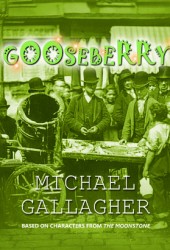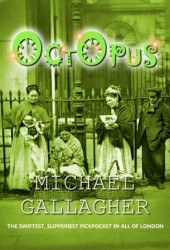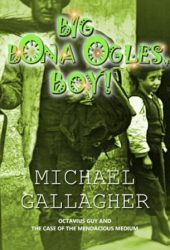
I’ve always enjoyed fiction written in, about or around the Victorian period.
This means I was delighted to discover Octavius Guy, known as ‘Octopus’ to his friends, developing his detective skills in a convincingly imagined Victorian London. Author Michael Gallagher has published two mysteries following Octopus’ adventures and the third instalment in the series, ‘Big Bona Ogles, Boy!’ or ‘Octavius Guy and the Case of the Mendacious Medium’, is due out soon. (You can read the blurb here and an extract here on the author’s website.) I asked Michael a few questions about his writing and the development of Octopus’ series and he has responded in detail.
——————————————————————————————————
E.H:
Hi Michael and welcome to Buried Under Books; it’s a real pleasure to have this opportunity to discuss the progress and direction of your work.
You’re the author of two series set in the Victorian era, ‘Send for Octavius Guy’ and ‘The Involuntary Medium’, and a non-fiction book titled ‘Why the Victorians saw ghosts’ (an illustrated guide to nineteenth century spiritualism). Clearly, this era holds a special interest for you (although I understand that you’re currently diversifying into 1870s rural New Zealand…) What is it about this era that captures your interest and what drew you to write fiction set in the period?
Michael Gallagher:
Fifteen years ago when I first set out to write a novel I happened to catch an Open University programme on the television in which the psychologist Richard Wiseman described the séances of the Victorian medium Florence Cook, and went on to talk about her relationship with the highly respected pioneering physicist William Crookes. Florence would allow her hands to be bound and then go into a trance behind a curtain. Lo and behold, out would pop the materialized ‘spirit’ of Katie King draped in what looks like a sheet. I was astounded! How could a scientist like Crookes believe such guff? And yet it seems that he, like many, did. Crookes even had a set of photographs made over two separate evenings to record Katie’s ‘materializations’ (hence my knowledge of the sheet).
Feeling that here at last I had some meaty material with which to work, I began researching anything and everything to do with the period. In addition to exploring the phenomenon of spiritualism, it meant delving into a lot of general history and culture of the 1800s—everything from the early use of electricity to how the poor managed to clean their dirty dishes, and whether girls wore leather boots.
I sent the manuscript off to HarperCollins and it ended up with a reader in their Children’s section. Although she didn’t think it was a children’s novel (nor did I, for that matter), she praised it to the hilt, which spurred me on to start writing a sequel—this time set in Egypt, again in the 1880s. If anything, the research was even more demanding. As well as trying to get my head around the fall of the eighteenth dynasty, I had to study the beginnings of Egyptology and learn how Victorian archaeologists went about their work—in one particular instance with a battering ram, would you believe!
I think I just ended up in the Victorian era by default.
Years went by. By now I was sending my writing to literary agents. Rewrite after rewrite ensued. I ended up being taken on by a junior agent named Maggie Evans at David Higham Associates, on the condition I rewrite them again to her own satisfaction. Tragically she died before I could finish. At this point I couldn’t face the thought of looking for another agent. A friend who loved both the books convinced me to try self-publishing. Before I did, however, I rewrote them one last time, stripping away everything that I’d changed about them and restoring them to their original freshness, a process which took approximately two years.
By 2014 I felt in need of a completely new direction: a new protagonist, a new voice, a new way of writing seemed in order. I am (or more accurately was) a teacher, and during my summer break I set to work on a project , simultaneously writing and publishing my third novel in regular weekly instalments on my Goodreads blog. It was undoubtedly a foolhardy project, but I felt able to commit to it because, yet again, it was set in the Victorian era and I naively imagined that I had already done much of the necessary research. In fact, this turned out not to be case, for ‘Gooseberry’ was set a good thirty years earlier than my first two books, and much had changed within that time. Interestingly, the fractured political parties of the early 1850s invite comparisons with the post-Brexit parties we have today. There was much debate about who, if anybody, Britain’s trading partners should be.
Then, of course, I started on ‘Octopus’, the second book in the series, which is again set in 1852. To answer your question, I think I just ended up in the Victorian era by default. But I’ve been doing it for so long now, I’m not sure I could write anything else. If I did, it would still have to be in an historical vein; it couldn’t be modern. I don’t think I could write a novel set in the present day.
E.H:
I’m going to focus on ‘Send for Octavius Guy’ because that’s the series I’ve been reading. Octavius is a reformed pickpocket who wants to become a detective. He works for Mr Bruff, an endearingly naive solicitor who keen readers may recognise from Wilkie Collins’ much-loved novel ‘The Moonstone’, but is supported by various characters from his past life.
You’ve chosen to focus on the lower classes, in distinct contrast to the authors of fiction written during the Victorian era. Are you conscious of giving a voice to those to whom it had been denied, or do you simply find these voices more engaging?
Michael Gallagher:
Both! Upper- and middle-class Victorian audiences may have had little time for the exploits of servants in their reading matter (unless they had done something shamefully wrong, or were of noble birth but, through some quirk of fate, had been delivered into parlous circumstances); modern audiences on the other hand have come to expect it. It certainly makes for a much richer tapestry.
When it occurred to me to write a novel using characters from ‘The Moonstone’, it seemed a perfect opportunity to explore some of the book’s more minor characters. Octavius Guy’s role is so minor that many people—even fans of the book—don’t remember him at all. When it came time to flesh him out, I decided to place him as having come from a deliberately criminalized underclass—where children either through poverty, hunger, or sickness were forced to steal to survive. Henry Mayhew’s ‘London Labour and the London Poor’ is full of such waifs. Luckily for Gooseberry, he has both the native intelligence and drive to better himself.
While he can successfully negotiate his way through most levels of society (he doesn’t get on too well with the lower-middle class, a point discussed in the forthcoming book), I would have a missed trick if I had not chosen to focus on his family and friends; they are, after all, generally more colourful than his upper-class clients. They speak differently too. You may have noticed that when Gooseberry is alone with his friends nearly all Victorian-isms dry up. Their voices are comparatively modern and, in all likelihood, more engaging because of it. I know I love to write for them, and that probably shines through too.
E.H:
Gooseberry himself is delightful: opinionated, forthright and fully capable of (eventually!) solving the mysteries posed to him. However, a number of your readers have shown a particular affection for Bertha, a good friend of Octavius and his brother Julius. Did this surprise you? What do you think Bertha’s appeal is?
Michael Gallagher:
You could have knocked me down with a feather! I should probably explain for the sake of your readers that Bertha is in fact a big, surly, deep-voiced Cockney bloke who, by the simple addition of a dress, imagines himself to be a woman. Nearly a quarter of all reviewers single out Bertha for a special mention. To quote but one, a woman named Devon Lewis: ‘I LOVED Bertha/Bertram. I wanted to be her friend.’ Another reviewer with a particularly wry sense of humour nominated her for Villain of the Year in a book-awards competition on Facebook, even though she was not the book’s villain. She didn’t win, but she made it to the final round of voting.
Bertha is in fact a big, surly, deep-voiced Cockney bloke who, by the simple addition of a dress, imagines himself to be a woman.
Bertha is very straightforward; she’s both generous and resourceful, and quite the dab hand at making soup. I’m never quite sure what’s going to come out of her mouth, because although she’s quite coarsely spoken, she has a surprisingly prudish streak that can sometimes rise to the fore. She is utterly loyal to her friends, and—in the case of Octavius and Julius (and now Walter, Alex, and Charley)—she’s a mother figure. She loathes bullying, is not afraid of a scrap, and has more than once proved herself the equal of any man stupid enough to take her on in a fight. I pity readers of the series for whom English is not their first language; between her dropped aitches and gees, her double negatives, and her regular transposing of ‘were’ and ‘was’ (as in, ‘I weren’t doin’ nothin’ wot I oughtn’t ‘ave been!’ and ‘We wasn’t doin’ nothin’ wot we oughtn’t ‘ave been!’), I sometimes wonder how they cope. And yet they do. Mrs Hudson (a huge Sherlock Holmes fan from Brazil, I think, wrote in her five-star review): ‘…great character by the way, though the slang ‘palari’ he/she speaks is not always easy to follow.’
E.H:
The London setting of your stories is clearly important to you. Scenes are carefully set in precise locations and you’ve taken the time to elaborate on the background of several key settings on your website, MichaelGallagherWrites. Do you have a strong connection to London yourself? Do you think Octavius could exist in a different time or place?
Michael Gallagher:
<Gasp of horror!> Never! In my mind Octavius is firmly rooted in history. He’s as real to me as if he actually existed. I know his younger self rather well, and I know quite a lot about his adult self, too. In 1852 he is a boy of fourteen, and in 1897 he will turn sixty. I am delighted to say that he’ll see the new century in. It’s a bit of a spoiler, but I think it will come as no surprise to learn that by this point he’s had a long and distinguished career as a detective in the Metropolitan Police. While there is a strong possibility he might one day travel the world (quite possibly in a professional capacity), he will always return to London…I doubt that his wife would have it any other way!
For my part, London is my adoptive home. I was born and raised in New Zealand, but came here in 1981 on a pilgrimage to see the birthplace of punk (nowadays I spend my time listening to Radio 3). I ended up staying and, after more than thirty years here, I no longer think of myself as a New Zealander. Neither do I think of myself as being British or English, but I do consider myself to be a Londoner.
E.H:
Octavius loves language and occasionally takes it upon himself to educate readers about the meaning of vocabulary he uses. Is this love of words a trait he shares with his creator?
Michael Gallagher:
It certainly is. I think the English language is a joy. People misuse it constantly, and yet it’s rugged enough to survive. When you consider the host of regional accents there are, you come to realize that there are thousands of forms of English, all managing to convey not just meaning but a wealth of cultural values as well. Well, usually, at least.
I once stood in a W. H. Smiths, purportedly reading a gaming magazine but in reality listening to a young Cockney couple discussing the merits of various games. What fascinated me was that their accent was the broadest I’d ever heard; I could barely make out the odd word here and there. The young woman moved away and started studying the video games on offer. She called out to her partner, who answered her with a, ‘What?’ After several more calls and several more whats, it became abundantly clear to me that he didn’t understand her either; what they needed—and what we all need, in fact, for language to work—is a mutually shared context. They were fine when they were looking at the magazine together; as soon as they couldn’t see what their partner was looking at, their understanding flew right out the window. Octavius would have been delighted by this encounter, I am sure.
I think at some gut level he understands that his use of language governs where he is placed and where he is able to place himself in society. As regards the explanations he gives for certain words (as pompous as they may be), they often hint at his own past frailties and mistakes. You can often tell who he’s learnt particular words from, and occasionally you even get a glimpse of him learning a new one, inferring its meaning from the context.
E.H:
Finally, I know you’re currently hard at work on the third novel in this series, titled ‘The Case of the Mendacious Medium’, with a view to releasing it around Christmas. I love the idea of the older George becoming a more significant character in the series and perhaps being something of a moral compass for the more experienced Gooseberry. How do you feel their developing partnership has affected the direction of the story and the feel of the novel?
Michael Gallagher:
It goes to the very heart of the story. In a novel such as this (a cosy mystery, and a character-led cosy mystery at that), what happens to the protagonist and his or her friends is just as important as any whodunnit element, in this case the attempted murder of a spiritualist medium recently arrived from Boston. I think the older George is interesting because, at the age of 18, he recognizes his limitations and he wants to better himself. He’s the perfectly motivated mature student. He realizes Gooseberry is his intellectual superior and is keen to learn from him. Since Gooseberry provides the narrative voice, it’s often difficult for me to bring his own particular foibles to the fore, and having George there enables me to do that.
With George, it’s been really fascinating to see how his character develops. I now know that he comes from quite a large family, that he attends church regularly, and that he still lives at home with his parents in Camden. He has a detecting style that drives young Gooseberry to distraction, and at the beginning of the book their friendship is already quite strained. George is keeping something from Octavius because he’s embarrassed to broach the subject; Octavius wonders how much he can safely reveal about his former life as a pickpocket, and dreads the idea of George meeting his friends. George questions the worth of Gooseberry’s lessons in detection (which—apart from memorizing ‘Guy’s Taxonomy of Opportunities for the Jobbing Detective’ by heart—never seem to amount to anything more than shadowing people). Gooseberry meanwhile questions George’s commitment to the job (as George becomes increasingly less available at the weekends).
The older George is interesting because, at the age of 18, he recognizes his limitations and he wants to better himself.
Relations improve temporarily when George is officially assigned to work with Gooseberry on a case involving a potentially forged will, until it becomes apparent to him that his role is to be little more than that of a silent acolyte. Matters reach an explosive head a few days before Christmas, to the point where it would take an absolute miracle for the pair to ever talk to each other again. Do they get their miracle? Of course they do; just not in the way that either of them would have wished.
In addition to this, I think you will be taken with one of the minor characters I introduce, who is likely to pop up in future books. She may play only a very minor part in this one, but I can’t see her allowing that to continue. As soon as she speaks, you just know that she’s destined for bigger things.
E.H:
Ooh, intriguing! Thank you for taking the time to answer my questions and indulge my curiosity about your motivations.
Now there’s nothing for me to do but wait to learn more about Gooseberry and George’s adventures!
——————————————————————————————————
Keep an eye out for the third book in this series: Big Bona Ogles, Boy! or Octavius Guy and the Case of the Mendacious Medium
Missed the first two? Read my reviews of ‘Send for Octavius Guy 1: The Case of The Thieving Maharajah’ and ‘Send for Octavius Guy 2: The Case of The Throttled Tragedienne’ or visit Michael Gallagher’s website for more information.
You can even follow Octavius on Twitter. And Michael, of course!



2 Comments
I love this series. It takes me back in time. I feel like I am right in the room or on the cold hillside. This latest book appeals to my cozy mystery addiction as well as my love of things mystical.
I’m not a fan of mystical things myself, but I love a good mystery. 🙂 Emma